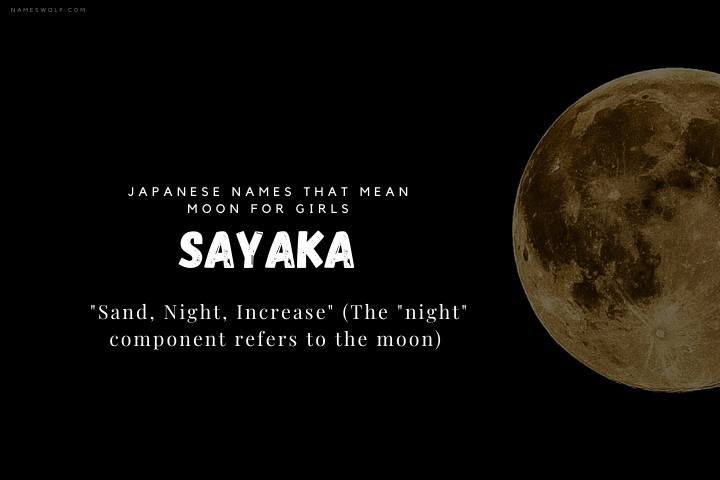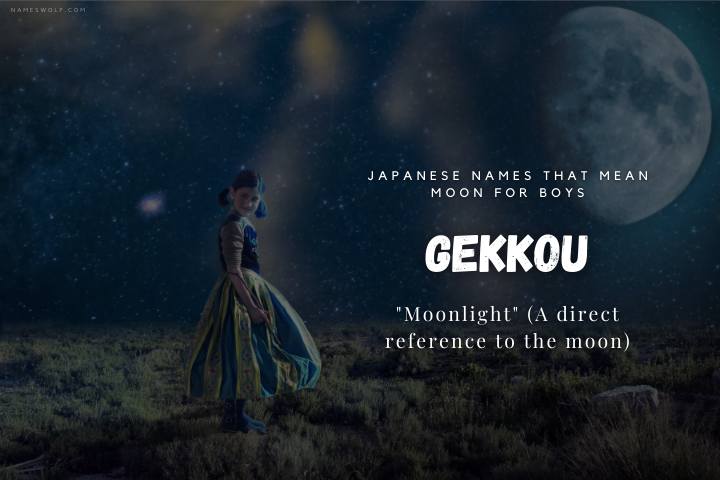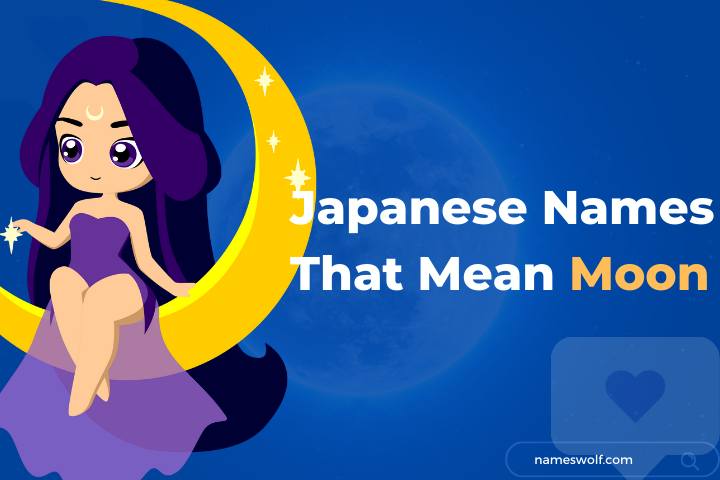Have you ever wondered about the meanings behind Japanese names? From nature to celestial bodies, Japanese names often carry beautiful and symbolic meanings. In this article, we will explore the enchanting world of Japanese names that mean moon.
The moon has been a source of inspiration and fascination for centuries, and it holds a special place in Japanese culture. Join us as we delve into the meanings behind these names, their cultural significance, and the popularity of moon-related names in Japan.
Whether you are looking for a unique name for your baby or simply interested in the rich tapestry of Japanese culture, this article will provide you with a deeper understanding of the moon’s influence on Japanese names.
Japanese Names That Mean Moon for Girls
Here are some Japanese names for girls that have meanings related to the moon:
Tsukiko (月子) – “Child of the Moon”
Mizuki (美月) – “Beautiful Moon”
Akari (明里) – “Brightness of the Moon”
Kaguya (輝夜) – A reference to the legendary moon princess Kaguya-hime.
Aya (彩) – “Colorful Moon”
Tsukiyo (月夜) – “Moonlit Night”
Haruka (遥) – “Distant Moon”
Ayame (菖蒲) – “Iris Moon”
Nozomi (望) – “Hopeful Moon”
Yuzuki (夢月) – “Dream Moon”
Suzu (鈴) – “Bell” (The sound of bells can be reminiscent of a serene moonlit night)
Hikari (光) – “Light of the Moon”
Sora (空) – “Sky” (The moon is often seen in the sky)
Yoru (夜) – “Night” (Associated with the moonlit night)
Kiyomi (清美) – “Pure Beauty of the Moon”
Mariko (真理子) – “Child of Truth and the Moon”
Sayaka (沙也加) – “Sand, Night, Increase” (The “night” component refers to the moon)
Sakura (桜) – “Cherry Blossom Moon” (Cherry blossoms are often associated with the moon in Japanese culture)
Amaterasu (天照) – A reference to the Shinto sun goddess, but it can also be associated with the moon.
Rei (麗) – “Beautiful Moon”
Yumeko (夢子) – “Child of Dreams and the Moon”
Mikazuki (三日月) – “Crescent Moon”
Mio (美緒) – “Beautiful Thread of the Moon”
Nagisa (渚) – “Seashore” (The moon’s reflection on the sea)
Ruri (瑠璃) – “Lapis Lazuli Moon”
Minori (実紀) – “Harvest of the Moon”

Natsumi (夏美) – “Beautiful Summer Moon”
Asuka (明日香) – “Fragrance of Tomorrow’s Moon”
Kokoro (心) – “Heart” (Emotional connection to the moon)
Aki (秋) – “Autumn” (The moon is often associated with autumn in Japanese poetry)
Tsukimi (月美) – “Beautiful Moon”
Yuika (結花) – “Moon Flower”
Suzume (雀) – “Sparrow” (Sparrows are said to fly to the moon in Japanese folklore)
Yumika (夢香) – “Fragrance of Dreams and the Moon”
Hanako (花子) – “Flower Child” (Moonlight enhances the beauty of flowers)
Kaede (楓) – “Maple” (Maple leaves can resemble the shape of the moon)
Hoshiko (星子) – “Child of the Stars” (The moon is often associated with the stars)
Yuina (結菜) – “Harvest Moon”
Hikaru (光る) – “Shining Moon”
Kanade (奏) – “Play Music” (Moonlight can inspire music)
Yuzuki (柚月) – “Citrus Moon”
Kozue (梢) – “Tree Branch” (The moon is often seen through tree branches)
Suzuha (鈴羽) – “Bell Feather” (A poetic reference to the moon)
Runa (瑠奈) – “Lapis Lazuli of the Moon”
Chisato (千里) – “A Thousand Miles” (A reference to the moon’s distance)
Mizuho (瑞穂) – “Harvest of Blessings”
Yuriko (百合子) – “Child of the Lily” (Lilies are associated with the moon in Japanese culture)
Yumemi (夢見) – “Dreaming of the Moon”
Fuyuko (冬子) – “Child of Winter” (Winter moons can be particularly beautiful)
Satsuki (皐月) – “Fifth Month” (May, traditionally associated with the moon)
Japanese Names That Mean Moon for Boys
Here are a few Japanese names for boys that have meanings related to the moon, along with their significance:
Tsukasa (司) – “Duty” (Signifying the moon’s watchful presence)
Gekkou (月光) – “Moonlight” (A direct reference to the moon)
Kaito (海斗) – “Big Dipper” (A constellation associated with the moon in Japanese folklore)
Tsukinari (月成) – “Becoming the Moon” (Symbolizing a connection to the lunar cycle)
Haruki (春樹) – “Spring Tree” (The moon’s influence on nature in spring)
Mizuki (水樹) – “Water Tree” (Reflecting the moon’s influence on bodies of water)
Akito (秋斗) – “Autumn Star” (Autumn is often associated with the moon)
Yoru (夜) – “Night” (The moon’s significance during nighttime)
Tsukumo (九十九) – “Ninety-Nine” (A reference to the phases of the moon)
Yuzuru (譲) – “Yield” (Signifying the moon’s calm and peaceful influence)
Hiroaki (宏明) – “Broad and Bright” (Reflecting the moon’s illumination)
Hikaru (光) – “Light” (Signifying the moon’s radiant glow)
Shunichi (俊一) – “Glorious First” (The moon’s significance at the beginning of the night)
Tsukasa (司) – “Duty” (Signifying the moon’s constant presence)
Ren (蓮) – “Lotus” (Lotus flowers are associated with the moon in Japanese culture)
Ryouta (涼太) – “Refreshing Big” (Signifying the moon’s cool and calm demeanor)
Tsukiyama (月山) – “Moon Mountain” (The moon’s influence on the landscape)
Satoshi (聡) – “Wise” (Reflecting the moon’s serene wisdom)
Yutaka (豊) – “Abundance” (The moon’s role in the changing seasons)
Riku (陸) – “Land” (The moon’s connection to the earth)
Nozomu (望) – “Hope” (Signifying the moon’s optimistic influence)
Keitaro (慶太郎) – “Joyful First Son” (Reflecting the moon’s ability to bring joy)
Haruki (陽輝) – “Sunshine Radiance” (The moon’s light as a reflection of the sun)
Tsukumo (九十九) – “Ninety-Nine” (A reference to the moon’s phases)
Akira (明) – “Bright” (Signifying the moon’s brightness)
Yuzuki (夢月) – “Dream Moon” (Reflecting the moon’s dreamlike quality)

Tsukihiko (月彦) – “Moon Prince” (A reference to the moon’s royal and ethereal qualities)
Sora (空) – “Sky” (The moon’s connection to the night sky)
Souma (宗馬) – “Religious Horse” (Horses are associated with the moon in Japanese folklore)
Mizuto (瑞斗) – “Bountiful Big Dipper” (Reflecting the moon’s influence on abundance)
Tsukio (月尾) – “Moon Tail” (Signifying the moon’s trailing light)
Kazuki (一希) – “One Hope” (Reflecting the moon’s hopeful influence)
Ryousuke (良介) – “Good Helper” (The moon’s role in guiding travelers at night)
Takashi (孝) – “Filial Piety” (Reflecting the moon’s nurturing and caring nature)
Tsukasa (彪) – “Outstanding” (Signifying the moon’s outstanding beauty)
Yuzen (夢前) – “Before the Dream” (Reflecting the moon’s dreamy presence)
Soushi (蒼司) – “Blue Officer” (The moon’s calming and tranquil influence)
Kiyoshi (清) – “Pure” (Signifying the moon’s purity)
Tsukiko (月子) – “Child of the Moon” (A direct reference to the moon)
Haruki (春樹) – “Spring Tree” (The moon’s influence on the growth of trees in spring)
Yutaro (雄太郎) – “Heroic First Son” (Reflecting the moon’s heroic and protective symbolism)
Reo (怜央) – “Wise Center” (Signifying the moon’s wisdom)
Tsukuru (創) – “Create” (Reflecting the moon’s creative influence)
Hiroshi (浩) – “Broad” (Signifying the moon’s expansive presence)
Yuto (悠斗) – “Plentiful Big Dipper” (Reflecting the moon’s abundant qualities)
Tsukito (月人) – “Moon Person” (A direct reference to the moon)
Hayato (隼人) – “Falcon Person” (Falcons are associated with the moon in Japanese folklore)
Tsukumo (九十九) – “Ninety-Nine” (A reference to the moon’s phases)
Akatsuki (暁) – “Dawn” (Signifying the moon’s transition to day)
Tsukasa (亮) – “Bright” (Reflecting the moon’s brilliance)
Unisex Japanese Names That Mean Moon
Here are 20 unisex Japanese names that have meanings related to the moon:
Tsukinami (月波) – “Moon Wave”
Ayamegata (菖蒲潟) – “Moonlit Iris Field”
Mizuhana (水花) – “Water Blossom” (Referring to the moon’s reflection on water)
Tsukigami (月神) – “Moon Deity”
Soraakari (宙明かり) – “Sky Illumination” (Signifying the moon’s light)
Kagayatsuki (輝月) – “Radiant Moon”
Harukaze (春風) – “Spring Breeze” (Reflecting the moon’s influence on the seasons)
Yureizora (夢霊空) – “Dream Spirit Sky”
Tsukikumo (月雲) – “Moon Cloud” (Signifying the moon’s connection to the night sky)
Amatera (天対) – “Heavenly Harmony” (Associated with celestial bodies like the moon)
Tsukinoo (月之尾) – “Tail of the Moon”
Tsukikiri (月切) – “Moon Cutter” (Signifying the moon’s phases)
Usagitsuki (兎月) – “Moon of the Rabbit” (In reference to the rabbit on the moon in Japanese folklore)
Yumekage (夢影) – “Dream Shadow” (Reflecting the moon’s mystical aura)
Tsukimori (月守) – “Moon Guardian”
Tsukiyori (月頼) – “Moon Reliance” (Symbolizing the moon’s dependable presence)
Yuuyoru (夢夜) – “Dreamy Night” (Signifying the moon’s dreamlike qualities)
Tsukinooe (月之御影) – “Shadow of the Moon”
Amanotsuki (天の月) – “Heaven’s Moon”
Yozakura (夜桜) – “Nighttime Cherry Blossom” (Cherry blossoms are often associated with the moon in Japanese culture)
Also Read:
Japanese names that mean moon hold a deep and profound significance in Japanese culture, symbolizing beauty, serenity, and the passage of time. These names are not only poetic and evocative but also carry a sense of timeless elegance. Whether used as given names or as poetic expressions, these moon-related names have the power to resonate with individuals on a personal level.
